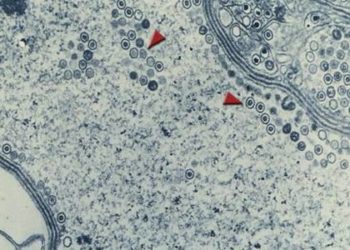HSV treatment increasing without change in incidence
1. Acyclovir use in infants and children significantly increased from 1999 to 2012 without an increase in herpes simplex virus encephalitis incidence. Hospital length of stay was significantly longer for those with non-herpes diagnoses treated with acyclovir when compared to those not treated.
Study Rundown: Herpes simplex virus (HSV) encephalitis is an uncommon, though dangerous disease condition in children and adolescents. As the clinical manifestations of HSV encephalitis differ by age, the empiric diagnostic and therapeutic approaches used in newborns may not be appropriate for older children. Despite this, many practitioners test and treat HSV in a similar manner to that of neonates. Researchers completed this study to examine national HSV empirical treatment trends and factors contributing to HSV testing at pediatric hospitals. Over the course of the 14-year study period, researchers found that acyclovir treatment at 15 pediatric hospitals was initiated with increasing frequency. Treatment rates were especially high among patients ultimately diagnosed with viral meningitis, septicemia, and fever. Researchers also studied HSV testing trends at a single large, pediatric care center, finding that the majority of children tested for HSV lacked features consistent with HSV encephalitis and had negative PCR testing. Although testing was evaluated at only one institution, this study’s broad evaluation of treatment trends suggests that additional hospital costs and potential patient harm may occur as testing and treatment of HSV increases in the absence of clinical features.
Clinic to read the study, published today in Pediatrics
Relevant Reading: Encephalitis in children
Study Author, Dr. James Gaensbaurer, MD, MScPH, talks to 2 Minute Medicine: Children’s Hospital Colorado, Division of Infectious Diseases.
“In this study we found that diagnostic practices and strategies of empiric treatment for HSV encephalitis are becoming less and less discriminant in US hospitals over the last 10 years, risking patient harm and excessive health care expenditures. Our findings argue for a return to increased reliance on clinical judgment, and have relevance not only for HSV diagnosis and treatment, but for the broader practice of clinical medicine.”
In-Depth [combined cross-sectional and retrospective analysis]: Patient data from those being treated for HSV or central nervous system (CNS) infections from January 1999 through December 2012 was taken from the Pediatric Health Information Systems (PHIS) for examination of treatment trends. The PHIS includes diagnostic data from 15 major children’s treatment centers throughout the United States. A total of 743 ICD-9 coded cases of invasive HSV infections were identified from the PHIS database. Over the study period, use of acyclovir for non-herpes CNS diagnoses (e.g. viral meningitis, septicemia, and fever) increased from 10.8% to 14.5% (P < 0.001). The number of HSV cases over the same time period did not increase significantly. Hospital length of stay was approximately 2 days longer in children who received acyclovir for non-herpes diagnoses when compared to those that did not (5.85 vs 3.76 days, P < 0.001). To characterize HSV testing trends, patient data from those who underwent HSV PCR testing at Children’s Hospital Colorado from 2007 to mid-2013 was also analyzed. A total of 3006 HSV PCR tests were included, with only 3 (0.22%) positive results out of the 1394 sent on children > 30 days. Of the patients tested, only 4%of those with negative results had clinical features consistent with HSV encephalitis.
More from this author: Weight loss interventions concurrently targeting parent and child benefits both parties; Severity of post-concussive symptoms not predictive of recovery
Image: PD
©2012-2014 2minutemedicine.com. All rights reserved. No works may be reproduced without expressed written consent from 2minutemedicine.com. Disclaimer: We present factual information directly from peer reviewed medical journals. No post should be construed as medical advice and is not intended as such by the authors, editors, staff or by 2minutemedicine.com. PLEASE SEE A HEALTHCARE PROVIDER IN YOUR AREA IF YOU SEEK MEDICAL ADVICE OF ANY SORT.








